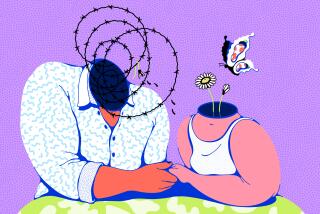She’s Wondering Why the ‘Power Guys’ Always Treat Her Badly
- Share via
Question: I am often a sucker for a “power guy,” a man who seems to exude power because of his position, money or overbearing personality. It turns me on, and I practically put myself at his disposal. In no time he’s treating me badly, and I am taking it. When I’m reduced to a wretched, desperate nothing, he dumps me. Why am I so hooked on men like that?
Answer: When Henry Kissinger remarked that power was the ultimate aphrodisiac, he was making an observation that is true for some women. Dr. Althea Horner, in her insightful book, “The Wish for Power and the Fear of Having It” (Jason Aronson Inc., 1989), shows how it begins for many women when they are little girls with an intense emotional involvement with a father who seems powerful because he is strong, controlling, seductive, frightening or distant. His power, and their own submissive weakness, can have a sexual coloring to it, even if there is nothing overtly sexual happening.
The important issue is not just your attraction to a powerful man, but your willingness, or even eagerness, to surrender your own power to him. You completely lose sight of the fact that you and he are equal adults. Why are you so ready to be powerless? Is there something about being a powerful and complete person that scares you? Do you hide your own wishes for power by identifying with your man and living through him as he treats people, including you, overbearingly? Is your sexuality tied to being the submissive little girl you were when you first began experiencing sexual feelings toward someone powerful?
Since you keep repeating the pattern, you ought to get professional help. If you don’t, it could continue happening, further crushing your morale and keeping you from claiming your own inner strength.
Q: A few months ago, my wife of 12 years said she wanted a divorce. That was very depressing because I had always tried to give her what she wanted. In fact, I gave her a divorce because that’s what she wanted. I have lots of fears of dating again, and something has happened that makes these fears worse. I have discovered that I have genital herpes, even though I had sex with no one but my wife for more than 12 years. Besides having to face what it probably means about my wife’s activities, I don’t know what to do about having new sexual partners.
If I tell the lady that I have herpes beforehand, I take the chance that she will say either: “Don’t worry, I have it also,” which would turn me off, or she’ll be disgusted and say, “Get away from me.” She could tell everybody in town, and then people would be afraid even to shake my hand. That’s what my reaction would have been before. I thought people with herpes were dirty scum of the Earth. Everyone I know thinks that way, so how do I date and try to have a somewhat normal sex life?
A: About five years ago the media and some highly publicized preachers labeled herpes as a new “scarlet letter”--a fitting and awful punishment for promiscuity. While this happened after medical reports presented evidence that herpes was not the awful plague that it is frequently characterized as, the fears and myths remain in the minds of some people.
Herpes episodes, which may occur a few times a year, can be uncomfortable and even painful, but often the attacks are mild and widely spaced in time. While many, like yourself, came to believe that herpes was an indication of extreme promiscuity, many people who get herpes contract it from one of their first few sexual experiences.
What does this mean to you as you approach dating again and wish to have sexual relationships? It means viewing herpes as an inconvenient viral disease rather than as a sign of being a moral leper. It means learning all you can about the course of your herpes symptoms. It also means really getting to know the person you are dating and developing enough closeness and trust so that you can tell them you have herpes, what you know about how you got it and what you have learned about how to take care of it.
At one time I would have said that merely avoiding sexual contact while you were having the symptoms would be enough, but there is evidence now that some people have transmitted herpes even when no symptoms were evident. So, unfortunately, that is no guarantee. There are definite precautions you can take, and it is important for you to discuss with your doctor what your best approach is to avoid passing on the virus.
I have found, in the single men and women I have counseled who have genital herpes, that if they do not take a judgmental attitude toward their disease, if they develop a good relationship with their partner and then are straightforward and factual about their herpes, the partner will usually appreciate their honesty and responsibility. Once that happens, the two people can cooperate to approach sex with appropriate precautions and deal with herpes as a minor inconvenience.


